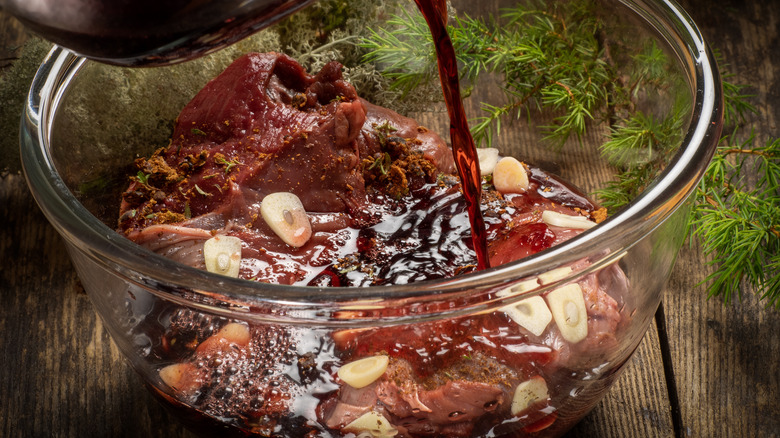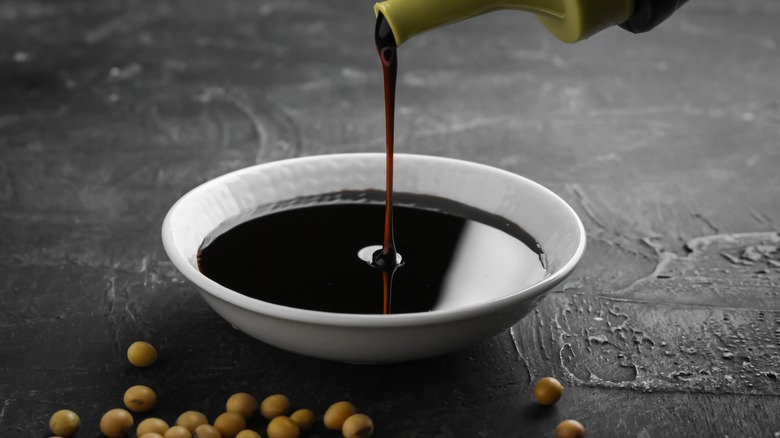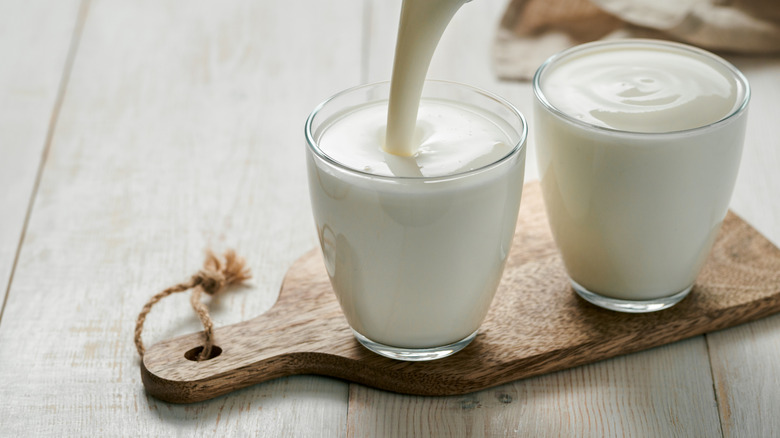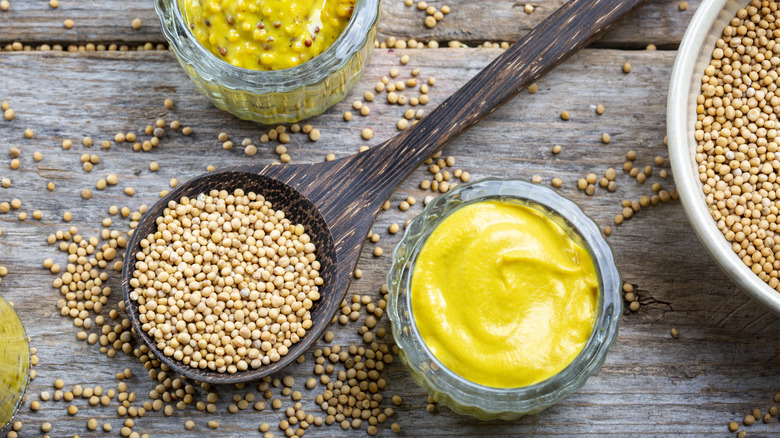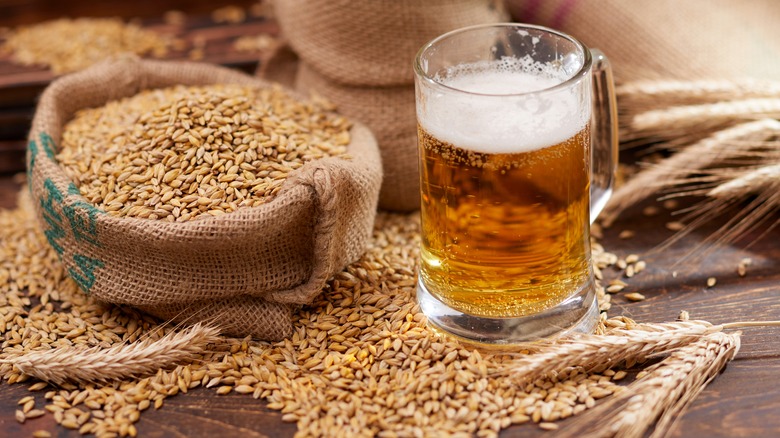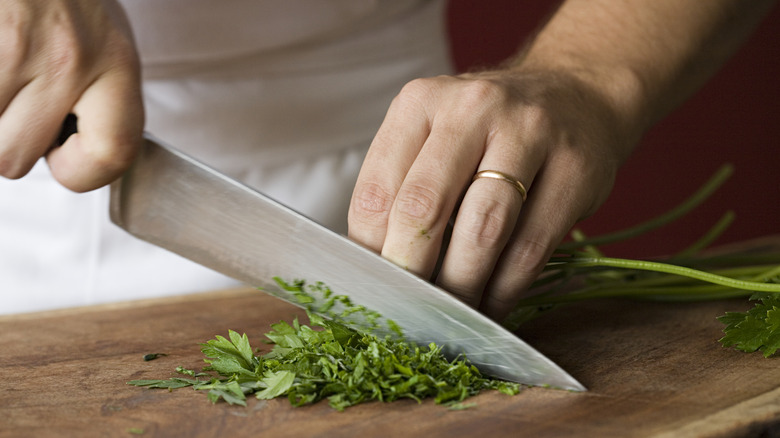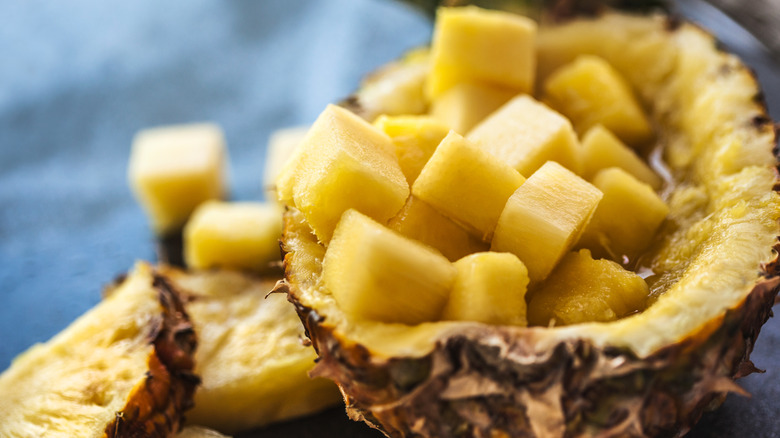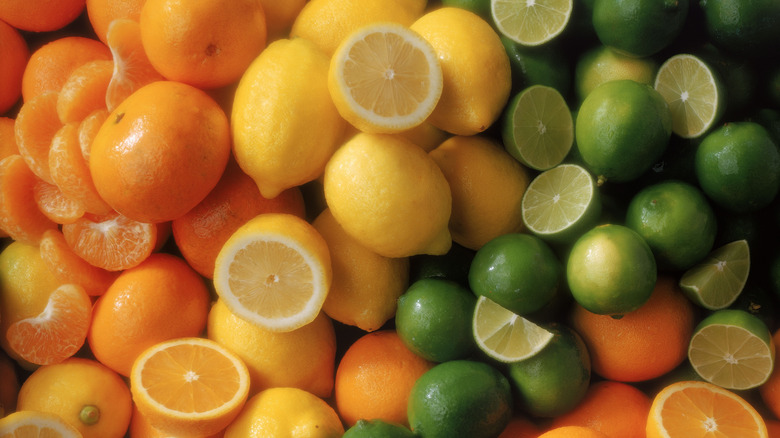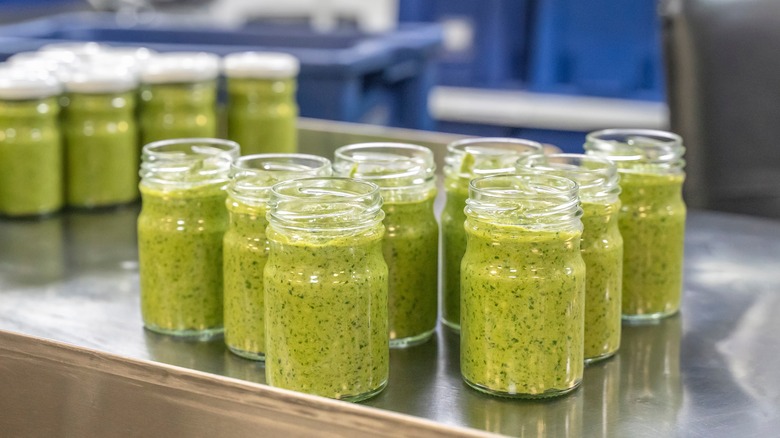Unique Steak Marinades You Need To Try
Some say that a steak needs no seasoning except salt and pepper, but a good marinade goes a long way when adding flavor and sometimes even tenderness to steaks. Indeed, while some marinade ingredients like herbs and spices give steaks an aromatic boost, other ingredients, particularly acids like vinegar or fruit juices, actually change its texture by breaking down the sinuous fibers of tougher cuts to render them even more tender. It's for this reason that so many recipes for tougher cuts like skirt steak, flank steak, or brisket call first for marinating the meat. Given the extra help of the marinade, the resulting steaks will truly shine.
Most meat marinades will call for a few ingredients, some of which will be there to provide flavor, like aromatics and spices. But, you'll also nearly always find a source of salt, a source of sugar, an acid, and a fat. The source of salt, whether it's salt itself or a salty condiment like soy sauce, serves to season the meat, allowing all the flavors to pop. The sugar, meanwhile, will lend caramelization to the outside of the meat, giving you a lovely dark brown crust. The acid serves to tenderize the meat, while the fat will carry the flavors and help them better permeate.
Whether you're looking to imbue your steak with extra flavor, improve its texture, or both, here are some of the most unique steak marinades you need to try.
Soy sauce
A good steak can be set off with just a bit of salt, but soy sauce truly pushes a steak's savoriness over the edge. This is because soy sauce isn't just salty, but it's also savory and rich in umami, which gives the steak a certain moreishness and depth of flavor. Since steak is already rich in umami, adding the fermented sauce pushes the volume up to 11.
Soy sauce is frequently associated with Asian recipes, and indeed, soy sauce can be the backbone of an Asian-inspired marinade featuring, for example, sesame oil and lime juice. But, don't let yourself be limited to just that. Soy sauce can also work well with European ingredients like balsamic vinegar to create a marinade that's not rooted in any one cuisine but will serve to make your steak delicious. Consider using a sweet soy sauce for a steak that will come off the grill or out of the pan with even more rich caramelization.
Yogurt
Yogurt marinades are super common in both India and the Middle East, lending not just flavor but tenderness and juiciness to meats like steak. This is thanks to the acid present in the yogurt, which helps break down the fibers of tougher cuts of beef. As the acid gently breaks down the protein wall of the steak, the meat can absorb even more moisture, making the resulting steak not just more tender but also more juicy. And, since yogurt's acidity is more muted than that of vinegar or citrus, for example, it works more gently and more slowly, meaning that your meat will never end up rubbery — even if you marinate for longer than the recipe says.
But, yogurt marinades don't just do excellent work in the fridge. They also impart next-level deliciousness during the cooking process when their natural milk sugars caramelize and form a crisp crust on the outside of the beef. Yogurt-marinated steaks lend themselves particularly well to grilling for this reason.
Mustard
Mustard is an excellent base ingredient for steak marinades. Not only is its punchy flavor a welcome counterpoint to the richness of beef, but mustard pastes like Dijon mustard also contain acidity in the form of vinegar, which tenderizes the meat proteins and breaks down the tougher fibers. Seeing as mustard is a natural emulsifier, it provides a great backbone for marinades to which other ingredients like oils, vinegars, spices, and herbs can be added.
Mustard is also a great carrier for flavors, as evidenced by the panoply of flavored and infused mustards out there, ranging from tarragon mustard to mustard infused with gingerbread spices. Choosing one of these flavored mustards means you've done most of the work already; all you need is a bit of added fat to craft a unique, delicious steak with very little effort.
If you want to push a mustard-marinated steak up to 11, consider pairing the cooked steak with a homemade steak sauce. Béarnaise is a classic featuring fresh herbs and rich butter that will counterbalance the spice in the mustard well.
Beer
At your next barbecue, make sure to crack open a beer — and not just for drinking. Beer is a fantastic marinade base thanks to its natural acidity and sweetness. The natural sugars present in the beer caramelize when cooked over high heat so that the Maillard reaction creates a crispy, wonderfully dark crust on your beef. Moreover, it makes an excellent conduit for other flavors. Seasoning beer with brown sugar will bring out the sweetness even more while adding jalapeños will help permeate the entire steak with spice.
As for which beer to use, a full-flavored pils or lager offers a balance between malty sweetness and herbaceous hoppiness, while a stout like Guinness brings even more flavor to the party with coffee and almost chocolatey notes. Choose a beer you like to drink and consider pairing the cooked steak with a cold one — the flavors in your dish and your glass will talk to one another for an even tastier overall experience.
Herb purée
The delicate flavor of fresh herbs is a wonderful seasoning for steak, particularly when used in a rich, heady marinade. To make one at home, all you need is a blender or food processor. Blitz basil, parsley, and mint with acidic lemon juice, rich olive oil, aromatic garlic, and shallot to create a vibrant paste to coat skirt steak, marinating it for at least two hours before throwing it on the grill.
While you never want to put a steak sopping wet with marinade directly over the heat, when using fresh herbs in a marinade, you'll want to be particularly careful about scraping off any excess before grilling, as the delicate leaves can burn. To make sure the freshest herb flavors come through, consider serving the steak with a salsa verde or chimichurri featuring the same herbs you used in your marinade, which will echo the flavors already present in the marinade.
Pineapple
Pineapple is a phenomenal marinade ingredient, and not just because it marries sweetness and acidity for a steak that's both caramelized and tender. Fresh pineapple juice contains an enzyme known as bromelain, which contributes to that feeling you sometimes get in your mouth when you've over-indulged in the tropical fruit. Indeed, this enzyme tenderizes flesh (including the flesh of your tongue). If you can get past that image, you'll understand why it does such a good job of making tacos al pastor or steak fajitas moist and tender!
That said, there are a few things to be aware of should you opt for pineapple in your marinade. First of all, know that bromelain is destroyed in the canning process, so only fresh pineapple should be used if you want to reap the full benefits. Secondly, marinades containing pineapple should not be left in contact with meat for over 12 hours. Any longer may see the meat begin to cook in the marinade itself, resulting in an unpleasantly rubbery final texture.
Citrus
The acidity and fresh flavor of citrus makes it the ideal marinade ingredient, tenderizing the beef and imparting loads of flavor for steak that's as luscious in texture as it is delicious. Paired with spices like cumin and chili powder, not to mention Worcestershire sauce and garlic for umami richness and depth, it forms the backbone of a marinade recipe that will truly push your steak fajitas to the next level. A squeeze of fresh lime juice over the cooked beef takes them to the next level.
Whenever you're marinating meat in citrus, however, you'll want to be particularly careful about how long you leave it in contact with the liquid. For arrachera, for instance, just 3 tablespoons of freshly squeezed lime juice is used to season 1 1/2 pounds of skirt steak, but you'll want to be sure you marinate it for no more than an hour. Any longer and your tacos will take on an unpleasant chewiness — no one wants that.
Pesto
Some marinades call for loads of herbs, spices, and liquids, but if you want one that just calls for a single ingredient, reach for the store-bought pesto. While perhaps more familiar as a pasta sauce, this Italian herb paste actually contains everything you need for a savory, flavorful meat marinade: Herbs, aromatics, and fat all come together to permeate the steak and lend it loads of flavor. If you've got it in you to add just one more ingredient, best make it an acidic one. Balsamic vinegar brings both tenderizing acid and rich sweetness to the finished marinade, imparting excellent texture and caramelized notes to the cooked steak.
Of course, if you want a bit more control over the final result, you could always make your own homemade basil pesto. Making the sauce from scratch doesn't just allow you to season it to your liking; it also means that you can swap other herbs in place of or in addition to the basil. Garlic scape pesto has a lovely pungency, while arugula adds a pleasantly peppery note.
Cola
Cola might seem like an odd ingredient to pour over your steak, but trust us: This method works. Cola contains both acid and sugars, which as we've seen is a double-barreled success story in any marinade. The acid in the soda helps tenderize the meat, and the sweetness comes out when you cook it, creating a deeply caramelized crust. Balanced by some more savory ingredients like Worcestershire sauce, garlic, or soy sauce, as well as some spice by way of cayenne or chili powder, it results in a steak you'll absolutely adore and one that's sure to keep your guests guessing when trying to come up with your secret.
That said, as with any acidic marinade, you'll want to set a timer to ensure that the cola doesn't denature the proteins in the meat. About eight hours should be enough to give you great flavor and texture. Any more and you'll end up with rubbery steak.
